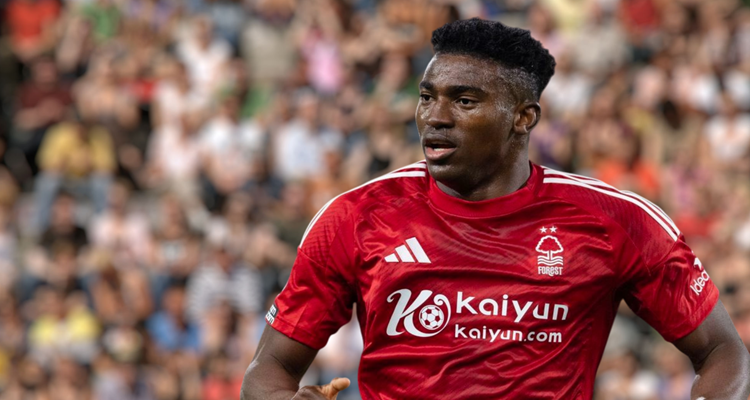Taiwo Awoniyi Recovering After Life-Threatening Injury

Nottingham Forest’s Taiwo Awoniyi is recovering from emergency surgery after a severe abdominal injury during a Premier League clash.
Taiwo Awoniyi’s Life-Threatening Injury: A Wake-Up Call for Football’s Safety Protocols
When Nottingham Forest’s Taiwo Awoniyi collapsed in visible agony during the final minutes of a tense Premier League draw against Leicester City, few could have imagined the gravity of the situation. The 27-year-old Nigerian international had collided violently with the goalpost—a moment that appeared painful but, to the untrained eye, survivable. What followed, however, was a cascade of medical revelations, procedural failures, and a stark reminder of the fragile line professional athletes walk between glory and grave danger.
The Collision That Nearly Cost a Life
The incident occurred in the 88th minute of a high-stakes 2-2 draw on Sunday. Awoniyi, always a physical presence in Forest’s attacking line-up, slammed into the post during a final offensive push. Despite visibly limping, he returned to the pitch—unaware that he had sustained a ruptured intestine, a life-threatening injury that often goes undetected until it’s too late.
Ruptured intestines can lead to internal bleeding, infection, and organ failure if not treated promptly. In Awoniyi’s case, surgery was performed quickly enough to prevent further complications. According to BBC Sport, he was placed in an induced coma to stabilize his condition post-surgery—a drastic but not uncommon medical response to allow the body time to heal.
A Breakdown in Communication
What makes this case particularly troubling isn’t just the severity of the injury, but the confusion that followed. Forest’s head coach, Nuno Espirito Santo, admitted post-match that Awoniyi remained on the field due to a “misunderstanding” between the medical and coaching departments. “We thought he was fine to continue, but that wasn’t the case,” he told reporters, adding that the communication lapse is now under internal review.
Such gaps in medical response are not unheard of in professional sports. A 2023 study published in the British Journal of Sports Medicine revealed that nearly 20% of on-field injury assessments in elite football were either misjudged or inadequately handled. While football has come a long way with protocols for concussions and cardiac arrests—bolstered by high-profile incidents like Christian Eriksen’s collapse during Euro 2020—internal injuries like Awoniyi’s remain a blind spot.
The Fragility of the Modern Footballer
This incident casts light on the often-overlooked physical toll that high-level football takes on the human body. Awoniyi’s case echoes that of former Hull City midfielder Ryan Mason, who suffered a career-ending skull fracture in 2017. Despite advancements in sports science, the human body remains vulnerable to impacts that surpass the threshold of tolerance—even in well-conditioned athletes.
Experts argue that clubs should invest more in real-time diagnostic tools. “We have GPS tracking, heat maps, and performance analytics. But when it comes to internal trauma, we’re still relying heavily on player feedback and visual assessments,” says Dr. Marcus Llewellyn, a London-based sports medicine physician. “It’s not enough.”
A Player’s Road to Recovery
As of the latest updates, Awoniyi is out of his induced coma and recovering steadily. His club, while quiet on details, has reiterated that his condition is stable. He will likely miss the rest of the season, and his return to football will depend on how his body responds over the coming months.
Rehabilitation from intestinal surgery can be grueling. According to the Cleveland Clinic, athletes who suffer from ruptured intestines typically require 3–6 months for full recovery, with rigorous medical evaluations before resuming competitive sports. Nutritional support, core strengthening, and gradual cardiovascular conditioning are critical components of the process.
The Bigger Picture: Safety First
Awoniyi’s injury has reignited debates within the footballing community about player safety and emergency preparedness. Social media was flooded with support from teammates, rivals, and fans alike, but many also criticized the visible delay in recognizing the severity of the situation.
Footballers’ unions like FIFPRO are now calling for standardized emergency protocols across all leagues. “We cannot rely on luck,” said FIFPRO Secretary General Jonas Baer-Hoffmann. “Every club needs a failsafe system where health overrides every other consideration—tactics, substitutions, or match stakes.”
Football’s Culture of Toughness
One of the underlying issues is the culture of “playing through pain” that still permeates professional sports. Athletes often downplay symptoms to stay in the game, driven by pride, pressure, or fear of losing their spot. In hindsight, Awoniyi’s choice to limp through the final 10 minutes reflects not just miscommunication, but an ingrained belief that courage equals endurance.
Changing that mindset starts with leadership—from coaches, medical staff, and governing bodies. Just as concussion protocols now mandate substitution regardless of a player’s insistence, internal trauma must also warrant the same urgency and non-negotiable protocol.
Lessons for Clubs and Fans Alike
This incident should serve as a teachable moment—not just for Nottingham Forest but for all clubs. Real-time injury detection technologies, clearer communication lines between medical staff and coaching personnel, and more comprehensive player education are essential next steps.
For fans, it’s a moment to appreciate the unseen risks that athletes shoulder. Behind every spectacular goal and last-minute tackle lies the possibility of lasting damage. Humanizing athletes, rather than glorifying their invincibility, could lead to a more compassionate and safety-conscious sporting environment.
A Crisis That Could Have Been Fatal
Taiwo Awoniyi’s brush with death underscores an urgent need for reform in how football addresses traumatic injuries. While his story is trending toward recovery, the systemic issues it exposes demand swift and serious action. In a sport that commands global attention and billions in revenue, ensuring a player’s health should never be left to chance or miscommunication.
Awoniyi’s resilience is commendable, but no athlete should have to pay such a steep price to be heard. Let his survival be more than just good fortune—let it be the catalyst for a safer, smarter game.
Source: (Reuters)
(Disclaimer: This article is based on publicly available information and media reports as of May 15, 2025. Medical and rehabilitation details are not confirmed by Nottingham Forest or the player’s representatives and should not be interpreted as official statements.)
Also Read: Virat Kohli Bids Adieu to Test Cricket: The End of a Fearless Era










